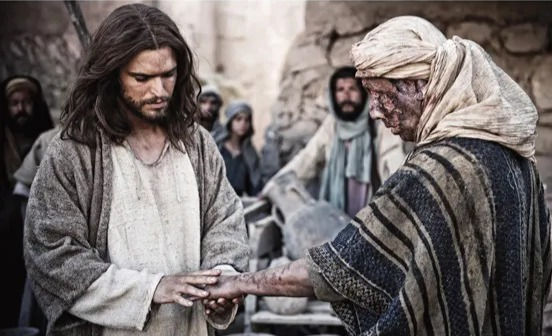THE ‘TOUCHING’ MINISTRY
- Charles
- 10 févr. 2024
- 4 min de lecture
Reflections for the Sixth Sunday in Ordinary Time (Leviticus 13:1-2, 44-46; 1 Corinthians 10:31—11:1; Mark 1:40-45)

The term “leprosy” occurs 68 times in the Bible: 55 times in the Old Testament (Hebrew tsara’ath) and 13 times in the New Testament (Greek lepros, lepra). For us in 2024, leprosy means Hansen’s Disease but for the biblical world leprosy was not just a physical disease but a spiritual affliction. This explains why the first reading insists, “As long as the sore is on him he shall declare himself unclean since he is in fact unclean”. It also reveals why the leper who approached Jesus does not ask to be healed but cleansed: “If you wish, you can make me clean”.
To the biblical world, leprosy is a powerful reminder of the seriousness of sin and its consequences. Like leprosy, sin starts small but can spread quickly, lead to other sins and cause great damage to our relationship with God and others. Biblical exegetes argue that this analogy was eventually misinterpreted to equate the physical condition of leprosy to the spiritual state of sin. Also, it is not rare that cultural, social, and health norms are given a religious justification and quoted with notions of ‘pollution’ and ‘cleanliness' to ensure their normativity. It is no surprise then that Jewish law declared lepers impure and treated them as excommunicated. Given the seriousness of the disease, and the limited medical advancement and resources, the lepers needed to be kept out of the society.
It is this objective that inspires the first reading to outline three important norms for the lepers to observe:
The one who bears the sore of leprosy shall keep his garments rent and his head bare, and shall muffle his beard (Leviticus 13:45). He shall dwell apart, making his abode outside the camp (13:46).
If he sees someone approach him, he shall cry out, “Unclean, unclean!” (13:45)
Since leprosy is contagious, he cannot touch anyone or be touched (5:3).
Surprisingly, the Gospel episode breaks/ reverses each of these norms. Jesus breaks with the tradition through the pastoral technique of touch.
The leper, who is supposed to stay outside the village, with dishevelled hair and an unkept beard to make himself unapproachable, enters the village to meet Jesus. The gospel insists, “A leper came to Jesus” (Mark 1:40) breaking norm no1.
The leper does not cover his lips, nor does he shout, “Unclean! Unclean”. Instead, he kneels and prays, “If you wish, you can make me clean” (1:40) defying norm no2.
While the law insists that touching a leper would defile a person, Jesus’ touch does not defile him. On the contrary, his touch cleanses the leper. The Gospel notes, “Moved with pity, he stretched out his hand, touched him” (1:41) breaching norm no3.
The touching ministry of Jesus reverses the excommunication rules of Leviticus. In his novel pastoral technique/gesture of touch, Jesus achieves two goals: integral healing (be made clean) and social integration (show yourself to the priest and offer for your cleansing). The law states that a leper needs to show himself to the priest and make a stipulated offering so he can be declared pure and return to his community. Jesus’ ‘touching’ ministry invites us to overcome the barriers of fear and separation that keep us from those considered “unclean” or “polluted”. God, in Jesus Christ, touches us and lets himself be touched. He is not a distant God who keeps his distance. In Jesus Christ, God’s proximity takes on a human face. Faced with man’s misery, God’s heart turns.
Both Miriam and Naaman are cured of leprosy in the Old Testament through Moses and Elisha respectively. However, Moses does not touch Miriam and Elisha does not touch Naaman. Responding to a “low-contact/no-contact” culture proposed by the rules of his times, Jesus developed a ministry based on ‘touch’. He touches a leper (Mark 1), a menstruating woman (Mark 5), and a corpse (Mark 5), all of whom are identified as unclean in the Mosaic Law. While the ‘religious’ of his times sought to avoid them, Jesus did not hesitate to touch or be touched by them all. At a time when ‘touching’ has become a serious ‘problem’ in our pastoral contexts (‘bad touches’ and abuse of minors, women, and men), Jesus proposes an alternative perspective: touching can be a pastoral technique in our ministry.
Pope Francis, in his address to the members of the Italian Federation of the Boards of Nursing Professions (FNOPI) on 03 March 2018, insists, "The importance of this simple gesture must not escape us: Mosaic law prohibited touching lepers, and forbade them to approach populated areas. However, Jesus goes to the heart of the law, which finds fulfilment in love of neighbour, and in touching the leper He reduces the distance from him, so that he may no longer be separated from the community of men and perceive, through a simple gesture, the closeness of God himself. Thus, the healing that Jesus gives him is not only physical, but goes to the heart, because the leper has not only been healed but also felt loved. Do not forget the “medicine of caresses”: it is so important! A caress, a smile, is full of meaning for the sick person. It is a simple gesture, but it lifts one up; a person feels supported, feels healing is near, feels as a person, not a number. Do not forget it".
The ministry of touching, when it follows the logic of incarnation, transforms our ‘touch’ into an instrument of healing and integration. Touching humanises the dehumanised. Paul invites us in the second reading, “Be imitators of me, as I am of Christ”. Let us imitate Christ in his ministry of ‘touching’ and ‘being touched’. May our touching ministry, bring wholeness and healing.




Commentaires